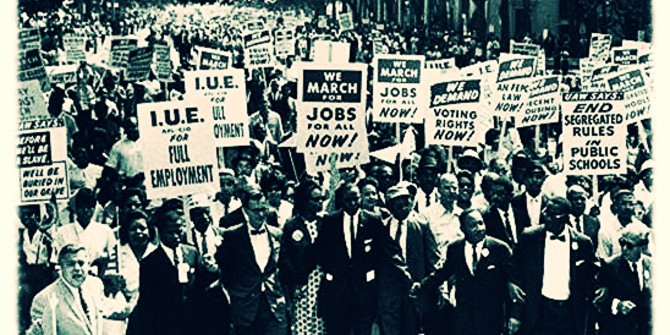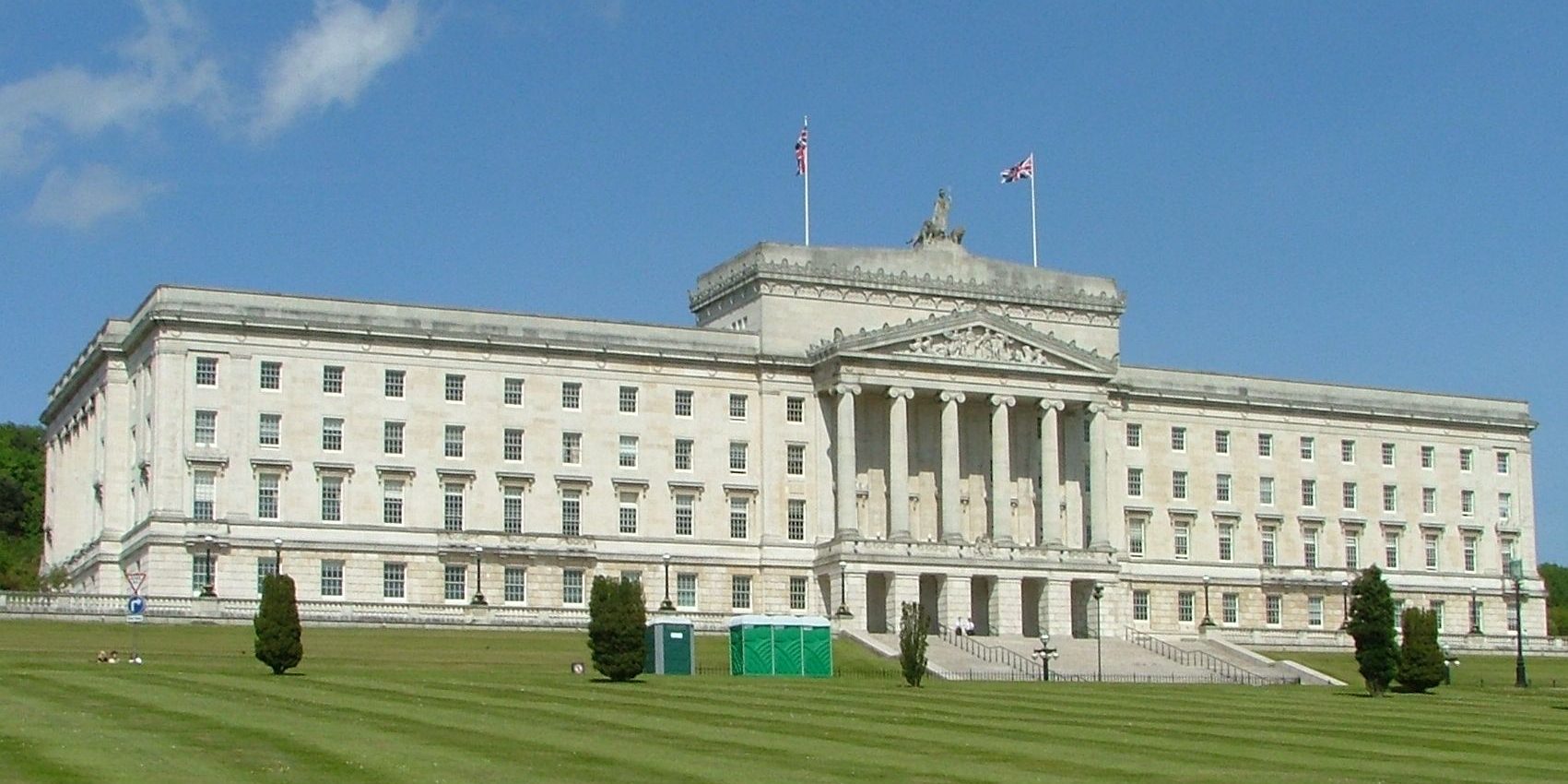Colin Murray (Newcastle Law School) argues that Northern Ireland’s Unionist Parties should rein in their opposition to the Ireland/Northern Ireland Protocol. Brexit has undoubtedly produced many immediate dislocations, but these could be mitigated under the Withdrawal Agreement processes and over time the unique access to the Single Market that Northern Ireland retained will make it an attractive base for companies seeking to trade in both the UK and EU.
The first few weeks of the operation of the Ireland/Northern Ireland Protocol have been characterised by upheaval in trade in goods. This should not have been surprising; the post-Brexit rules were finalised with pitifully little time for traders to adapt. But in amongst these so-called “teething troubles” following Brexit there are also longer-term adjustments to Northern Ireland de facto remaining in the EU Single Market for goods which are seeing some businesses in Northern Ireland reorient some supply chains through the EU Single Market where they once flowed through the UK.
These developments deeply concern Unionists in Northern Ireland, who see in them a dilution of Northern Ireland’s place in the UK. The debacle over the EU possibly imposing controls on COVID-19 vaccine movements from the EU into Northern Ireland reinforced a sense that the management of important decisions affecting Northern Ireland had been removed from the grasp of Northern Ireland’s institutions (and also the UK government). The main Unionist parties have thus banded together to seek the scrapping of the Protocol.

These efforts involve legal actions, petitions, fiery denunciations of the Protocol in the Northern Ireland Assembly and the UK Parliament and the threat of popular protests, styled by one DUP MP, in a singularly inappropriate phrase in the Northern Ireland context, as “guerrilla warfare” against the Protocol. This amounts to a classic playing of the “Orange Card”, by which the Unionist parties seek to persuade the UK government to backtrack on the basis that the cooperation of Unionists is necessary to make Northern Ireland governable.
The blueprint for this campaign was Unionism’s efforts against the Anglo-Irish Agreement in the latter half of the 1980s. It too began with legal challenges on the basis that the 1985 Agreement conflicted with Article 6 of the Act of Union, which maintains that under the Union the people of Northern Ireland should “be on the same footing” as those of Great Britain, including as provided under international agreements. For Unionists, it is axiomatic that Northern Ireland is being treated differently from Great Britain under the Protocol. Whereas the challenge to the Anglo-Irish Agreement was dismissed in a judgment of a few hundred words, the latest challenge will require greater attention.
The trading provisions of the Protocol rest on a sleight of hand. They maintain that Northern Ireland is part of the UK’s customs territory, but that it will continue in practice to apply the rules of the EU Single Market in goods. This arrangement might be unattractive, but it was arguably adopted by the UK government and the EU specifically to enable the settlement to be fitted within the UK’s constitutional arrangements without requiring explicit amendment of the Act of Union. The EU Withdrawal Agreement was approved by Parliament, which legislated to give effect to it. It was the central issue of the Conservatives’ 2019 General Election campaign.
The legal challenge to the Protocol on the grounds of the Act of Union and the Northern Ireland Act 1998 thus run into the reality of parliamentary sovereignty under the UK constitution. It is impossible to say that any alteration of the terms of this legislation has happened accidentally or by side wind. The UK Parliament was fully aware of the implications of its actions for Northern Ireland. For the courts to intervene, the Act of Union would have to be accepted as a constitutional measure of greater significance than the Brexit legislation, and that really would amount to a complete revolution in how we understand the UK constitution. The Union has, in reality, changed radically since 1801. If it can accommodate diverse devolution settlements without jeopardising the concept of its peoples being on the same footing, it can just as surely accommodate the Protocol.
The Protocol did not fall into place without thought. At present, the UK government rhetoric by which Northern Ireland will enjoy the “best of both worlds” under its terms (with a privileged place both within the UK Internal Market and the EU Single Market), seems particularly glib. But the new processes which accompanied the Protocol entering force were inevitably going to result in dislocations, especially for smaller businesses, when they were imposed with little lead-in period. Over time, however, the unique market access that Northern Ireland now enjoys will make it an attractive base for companies seeking to trade in both markets.
The Protocol is not, as has been suggested by Vernon Bogdanor, a nationalist solution adopted by a unionist government, it was necessitated by successive UK prime ministers accepting that a form of Brexit which imposed barriers to cross border trade on the island of Ireland would undermine the safeguards for cooperation between Ireland and Northern Ireland in the Belfast/Good Friday Agreement of 1998. Indeed, the terms of the Protocol are the symptom, not the cause, of the barriers which have developed between Northern Ireland and Great Britain. If the UK government had sought to maintain a high level of alignment between the whole of the UK and EU rules regarding trade in goods, as was set out in Theresa May’s version of the Brexit deal, the dislocations between Northern Ireland and Great Britain would have been mitigated. The nature of Brexit remains at the heart of the current disruption.
This is not a territory that judges will want to step into; the Brexit deal represents a set of deliberate policy choices which have been affirmed by Parliament. This leaves the question of what Unionists are to do with their opposition to these new barriers. Bringing their challenge to the courts will all but inevitably receive an unequivocal answer that the UK Parliament can legislate to manage the trading relationships between different parts of the UK. If such a rebuff does not blunt their campaign, then the UK Parliament also has the powers under the Withdrawal legislation to give effect to the Protocol should Unionists attempt to stymie its implementation through the departments they control in the Northern Ireland Executive.
What seems left is a scorched earth policy, seeking to make the Protocol so unworkable that there is a hope of persuading a majority within the Northern Ireland Assembly to abandon its trading provisions when they must be confirmed by it in 2024. If Northern Ireland’s governance exists in a state of perpetual crisis, moreover, inward investors will baulk at this instability and any putative benefits of the protocol will not be realised. This, however, should give Unionists pause for thought. Such a crisis, of their making, is only likely to intensify pressure for a referendum on the (re)unification of Ireland. By contrast, if the Protocol does create competitive advantages for companies operating in Northern Ireland, it offers Unionists the best chance to persuade its people of the benefits of remaining part of the UK.
And if, one day, Unionists do lose out in a referendum on Northern Ireland’s constitutional status, they will seek to make a case for ongoing close connections with the UK for Northern Ireland to be part of the new constitutional settlement in Ireland. The Belfast/Good Friday Agreement makes specific pledges as to the ongoing ability of the people of Northern Ireland to continue to identify as British, Irish or both in this eventuality. Adaptations such as a federal model for Ireland have, moreover, long been mooted in the context of (re)unification. If, in such a scenario, businesses have come to depend on the Protocol to the extent that much of Northern Ireland’s economy draws upon their unique access to the EU and UK, there is likely going to be an effort by Unionists to retain the Protocol’s unfettered access for Northern Ireland’s businesses to Great Britain as part of the negotiations over the shape of (re)unification.
It might therefore be time for Unionists to stop worrying and love (or at least tolerate) the Protocol.
This post represents the views of the author(s) and not those of the Brexit blog, nor of the LSE.






This article comes just as HMG performed another supreme act of self harm, unilaterally breaching the UK/EU trade agreement. Lewis previously attempted to breach the agreement in a limited and specific way,, well here it is.
Ii constitutional politicsv are not prepared for an examination of the legal provisions underpinning their statelet. Bringing the Act of Union into play, risks that Act, which was brought about by using the same provisions as were tried by Johnson (the Irish parliament was prorogued, and similar tactic to the Chiltern hundreds used).
Bringing these into play will remind and enrage the opposition in NI.
For some time now, the island of Ireland has been a single phytosanitary unit, which benefitted Unionist farmers. Those who stand to lose most by the resumption of hostilities.
The DUP is also playing with fire getting into bed with loyalist council, as they lose any moral superiority over SF. Forgotten is that during WWII and the period from 72-98 the were restricted movement between the islands.
Much has been made of shortages in NI supermarkets, there are shortages in RoI supermarkets as well. Both from UK multiples, reliant on supply chains through the channel ports. However nothing is missing in either jurisdiction in the German multiples.
All in all, NI had an opportunity to become something new in the world of trade, jettisoning that is an act of supreme folly. Both the DUP &:HMG need to look forward at the reputational damage being done, especially as HMG are commencing negotiating on financial matters, with the Irish Commissioner
I agree with aoco. The truth is that a unilateral decision by the UK to leave the EU (even though put to a referendum of its people) is inconsistent with the high degree of co-operation between Northern Ireland and the Republic of Ireland intrinsic to the Good Friday Agreement (again put to a referendum but this time agreed overwhelmingly by the people of both parts of Ireland). The DUP, who should have been fully aware of this, chose not only to campaign for brexit but enthusiastically supported leaving the single market and the customs union (a Conservative government decision not on the referendum ballot paper). The protocol is a somewhat desperate attempt to square the circle and ironically it is the DUP, conferring now with more shadowy “loyalist” elements who are throwing their toys out of the pram. As Colin Murray points out, there are potential benefits to Northern Ireland and he makes the neat point that the exploitation of the “foot in both camps” situation could even persuade a greater number of Northern Irish people away from Irish nationalism.
However we must not play down the difficulties that have emerged in the application of this protocol. it is urgently necessary to ameliorate some of these. For example the Alliance Party MP Stephen Farry is pressing for a veterinary agreement which could address sanitary and phyto-sanitary issues. One danger is that the UK government will baulk at anything which retains any formal co-operation with EU institutions. They should realise just how important it is to cater for the unique Irish situation. Cool heads and diplomacy are required and the unilateral action by the UK to extend the grace period does not help.
Good advice at the end of the article, but the DUP will be unable to take it. They display an almost miraculous talent for biting off their face, legs and arms to spite the rest of their body, and are temperamentally unable to shake off their supremacist and unbendable doctrines. If they start to believe that the world is in fact round, and that a British God didn’t make it in seven days, etc. etc. then they will be left with no beliefs at all.
All of these articles focus on the DUP. The reality is, that while the DUP are certainly victims of their own stupidity, the entire spectrum of unionism is opposed to the protocol…every political party, all the loyal orders, and every loyalist paramilitary grouping. There is widespread anger in the unionist community, even from moderate ‘soft’ unionists who voted Remain. There has been no compromise, because the unionist people of NI had the protocol foisted upon them….they did not agree. Their compromise was in the Good Friday Agreement, under which they gave up a lot. The GFA is a delicate balancing act and the fact is that the Protocol has serioulsy upset that balance. In my opinion amy unionist who signed up to the GFA is perfectly entitled to withdraw their support because Protocol has effectively voided that agreement.
Interesting article and comments. History will record that the Unionist support for Brexit was a huge own goal for Unionism.
Would it not better for the Island of Ireland to have a land border and the two entities work their own products such as cow milk to carton or beef to packaging.With support from their country or organisation it would allow them to thrive without outside interference..Each countries peoplle to be independent of the other. That after all was the whole idea of Irish seperation and to which both sides agreed and the situation the EU organisation inherited.
Dear Ian,
Don’t worry with the Northern Ireland constitucional status (as if there is still one…).
Next May, the Census 2021 results will be made public, with the certain Catholic Majority in the Six Counties of the Province, and all the members of the unionist/loyalist/orangist sects will have to choose to be:
1) British, and, as a consequence, be willing to relocate to Britain; or
2) Irish, and take comfort with the fact that, in the Daíl Éireann, the Sinn Fein Party still is a minority…
Best wishes,
Fernando Ferreira